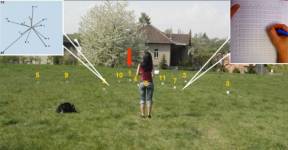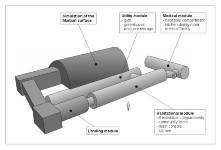Institute of Psychology
Academy of Sciences of the Czech Republic
Veveří 97, 602 00 Brno
Tel.: +420 532 290 129
E-mail: sikl@psu.cas.cz
Education
1996–2001 Ph.D. Psychology, Masaryk University, Brno
1989–1994 M.A. Psychology, Masaryk University, Brno
Professional experience
2003–present Head of the Department of Cognitive Psychology, Institute of Psychology ASCR
1996–present Researcher at Institute of Psychology ASCR
Research
Visual space perception
As a part of our visual space perception research, we conducted numerous experiments addressing mainly methodological issues. In one of our research project, we argue that the descriptors of visual space, such as exocentric size, egocentric distance, and exocentric direction, which are typically investigated independent of one another, are in fact inherently related. In another line of research, we compare the observers’ perceptual performance in three experiments with changing metrics of the requested response (judgments of ordinal, ratio, and absolute depth) and investigate whether with increased level of description of depth, the performance is decreasing accordingly. Publications [1], [3], [8], [12], [15], [21].
Visual perception after a long-term sensory deprivation
We examine the specifics of visual perception on the patients who, after a long period of blindness or visual deprivation, underwent a successful sight-restoring operation (artificial cornea implant, miniature telescope implant). For those patients, the perceptual domains that are particularly afflicted are object and face recognition, visual space perception, and a lower level of visual processing (i.e., perceptual organization). We hypothesize that their perceptual performance may be negatively affected by underlying problems with holistic processing of visual stimuli and by the decreased flexibility and robustness of perceptual representation, especially if the deprivation period was extremely long. On the other hand, the domains of color perception and motion perception appear to be largely intact. On the basis of our empirical findings, we try to design targeted training and rehabilitation routines for sight-recovery patients. Publications [1], [5], [6].
Confinement and its effect on visual perception
We had the opportunity to longitudinally investigate the perceptual performance of the volunteers participating in the Mars-500 project (http://mars500.imbp.ru), an isolation study that simulated a flight to Mars. The crewmembers spent 520 days in a sealed facility that was designed to resemble a spacecraft. From the list of potential stressors to which the crewmembers were exposed, we hypothesized that (i) the confinement to a restricted area and (ii) perceptual monotony are the most important factors potentially influencing the crewmembers’ visual performance and we aimed our research to monitor how it changed throughout the confinement. Specifically, we expected changes (i) in the crewmembers’ sensitivity to perspective information and (ii) in the flexibility of perceptual representations. Publications [1], [4], [9].
Depth perception in architecture
An observer resolves the ambiguity of the retinal image so that s/he selects the simplest (simplicity principle) and the most probable (likelihood principle) interpretation consistent with the image. It is interesting to observe how is this inclination addressed in the work of architects. Using various kinds of manipulations in perspective, proportions, figure-ground relationship and lighting, the architects can easily elicit the perception that does not strictly correspond to the actual structure of the observed objects (buildings, streets, gardens). The reason for utilizing these manipulations is not simple deceiving the observer’s eyes, but rather the aim to strenghten artistic or spiritual impression or to offer a new way of objects’ interpretation. Publication [22].
Visual illusions
We are planning for the interactive museum focused on visual perception in Brno, Czech Republic. Publication [23].
Publications
Book
Book translations
[2] Eysenck, M. J. & Keane, M. T. (2008).
Kognitivní psychologie. Praha: Academia (editor of the translation).
Peer-reviewed journal articles
[3] Šikl, R. & Šimeček, M.(submitted). Visual space perception at different levels of depth description. Journal of Experimental Psychology: Human Perception and Performance.
[4] Šikl, R. & Šimeček, M. (2014). Confinement has no effect on visual space perception. The results of the Mars-500 experiment.
Attention, Perception & Psychophysics, 76, 2, 438–451. PDF
[5] Šikl, R., Šimeček, M., Porubanová, M., Bezdíček, O., Kremláček, J., Stodůlka, P., Fine, I. & Ostrovsky, Y. (2013). Vision after 53 years of blindness.
i-Perception.
PDF[6] Kremláček J., Šikl, R., Kuba, M., Szanyi, J., Kubová, Z., Langrová, J., Vít, F., Šimeček, M. & Stodůlka, P. (2013). Cognitive processing of visual oddballs spared in patient with partial recovery of vision after 53 years of blindness. Vision Research, 81, 1–5. PDF
[7] Porubanová, M. & Šikl, R. (2013). Various categories of changes in the inducement of change blindness. Studia Psychologica, 55, 2, 83–94.
[8] Šikl, R. & Šimeček, M. (2011). Perceived size and perceived direction: The interplay of the two descriptors of visual space. Perception, 40, 953–961.
Peer-reviewed journal articles in Czech
[9] Šimeček M. & Šikl R. (2013). Dlouhodobá izolace a její vliv na zrakové vnímání: Výsledky projektu Mars-500.
Československá psychologie, 57, 4, 342–357.
[10] Šikl, R. (2010). Richard Langton Gregory (1923–2010). Československá psychologie, 54, 6, 613–614.
[11] Šikl, R. (2008). O nedokonalosti a omylnosti zrakového vnímání. Československá psychologie, 52, 3, 318–323.
[12] Šimeček, M. & Šikl, R. (2005). Větší nebo menší? Vnímání velikosti řazením. Československá psychologie, 49, 6, 505–523.
[13] Šikl, R. (2004). Alhazen (965–1039): jeho dílo v kontextu starověké a středověké optiky. Československá psychologie, 48, 4, 364–377.
[14] Šikl, R. (2003). Eleanor Gibsonová (*7.12.1910 – +30.12.2002). Československá psychologie, 47, 2, 169–172.
[15] Šikl, R. & Šimeček, M. (2002). Rozměr a orientace: spojité nádoby percepčního hodnocení prostoru. Československá psychologie, 46, 6, 490–508.
[16] Šikl, R. (2001). Hermann von Helmholtz (1821–1894) o vnímání. Československá psychologie, 45, 2, 166–178.
[17] Šikl, R. & Čermák, I. (2000). "Common sense" a psychologické teorie. Československá psychologie, 44, 5, 444–450.
[18] Šikl, R. (1998). Vnímání struktury pohybujících se objektů. Československá psychologie, 42, 245–259.
[19] Šikl, R. & Kouřilová, J. (1996). Obranné tendence v atribuci. Československá psychologie, 40, 4, 315–320.
[20] Čermák, I. & Šikl, R. (1996). Psychologie a "common sense". Československá psychologie, 40, 1, 46–54.
[21] Šimeček, M. & Šikl, R. (submitted). Za pochopením zrakového vnímání prostoru. Kapitola v připravované ústavní monografii.
[22] Šimeček, M. & Šikl, R. (2010). Klamání oka v architektuře. Kdo koho klame? A klame vůbec? In Miovský M., Čermák I. & Chrz V. (Eds.). Umění ve vědě, věda v umění. Praha: Grada (pp. 209–229).
[23] Šimeček, M. & Šikl, R. (2010). Jak a proč vznikají zrakové klamy. In Kvasnička V., Pospíchal J., Návrat P., Lacko P., Trebatický P. (Eds.). Umelá inteligencia a kognitívna veda II. STU Bratislava (pp. 467–522).
[24] Šikl, R. & Šimeček, M. (2009). Co vědí o vnímání povolání. In Petrů, M. (ed.). Struny mysli. Ostrava: Montanex (pp. 117–122).
[25] Šimeček, M. & Šikl, R. (2009). Směr v prostorovém vnímání. In Petrů, M. (ed.) Struny mysli. Ostrava, Montanex (pp. 123–131).
[26] Šikl, R. (2008). Vnímání z pozic konstruktivismu a enaktivního přístupu. In Kvasnička, V., Kelemen, J. & Pospíchal, J. (Eds.). Modely mysle. Bratislava: Europa (pp. 215–228).
Organizational activities
Grants
Principle investigator
2012–2013 "Longitudinal study of visual perception of sight-recovery patients after a long-term sensory deprivation", Grant project GA ČR P407/12/2528
2009–2012 "Perception and Memory Changes during Long-term Isolation", Grant project GA ČR 406/09/2003
2007–2009 "Selected aspects of the relationship between physical and visual space", Grant project GA ČR 406/07/167
2003–2005 "Visual perception of near space", Grant project GA ČR 406/03/D224
2000–2001 "Perceiving the structure of moving objects", Grant project GA ČR 406/00/0846
Co-principle investigator
2013–2015 "Prostorové vnímání fotografických scén", Grant project GA ČR 407–28709S
Courses taught




































